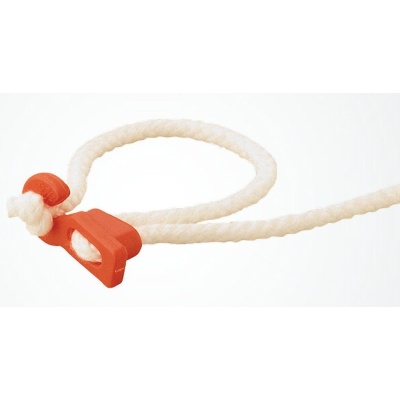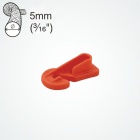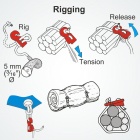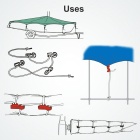Clamcleat Jiffy Tie
Description
The Clamcleat® Jiffy Tie is a simple low cost device which enables light loads to be swiftly secured. Typical appications include the reefing of sails, tying down of covers, securing bundles of sails, clothing, spars etc. - in fact, any of the numerous jobs on board or ashore which call for quick e
Read more| Code | Weight [g] | In Stock | Price | |
|---|---|---|---|---|
|
CL806
|
0 |
325 pcs i
Next
shipment |
1,00 €(0,83 € ex.VAT) |
|
The Clamcleat® Jiffy Tie is a simple low cost device which enables light loads to be swiftly secured. Typical appications include the reefing of sails, tying down of covers, securing bundles of sails, clothing, spars etc. - in fact, any of the numerous jobs on board or ashore which call for quick effective tying without the nuisance of knots. One industrial application is bundling of data cables while they are being installed. Manufactured from a UV resistant material, the CL806 is suitable for outdoor applications.
Which size to choose?
The diameters of the usable ropes listed in the table are extreme. Tensioners work optimally when used on ropes between the minimum and maximum diameter. It is also necessary to take into account the exact diameter of the rope (not rounded size) - the diameters of the Mastrant ropes are here or on a particular item in our online shop.
How long do cleats last?
This really depends on how cleats are used. We often see nylon cleats that are over 10 years old, when they have been used for light loads on control lines. However, tensioning a rope by dragging it back through the teeth will quickly burn out a nylon cleat. This is why alloy cleats were originally developed. Alloy cleats withstand this type of use, as long as the rope is clean. A dirty rope that is full of sand will wear out any fitting. Windsurfers and kitesurfers who have to rig on coral sand beaches certainly know that their equipment has a limited life. Hard anodised cleats have slightly better wear resistance than silver ones. Nylon cleats are completely resistant to salt water corrosion. They are also resistant to many acid and chemicals. Alloy cleats have "excellent” corrosion resistance. Hard anodised cleats have slightly better corrosion resistance than silver ones.





